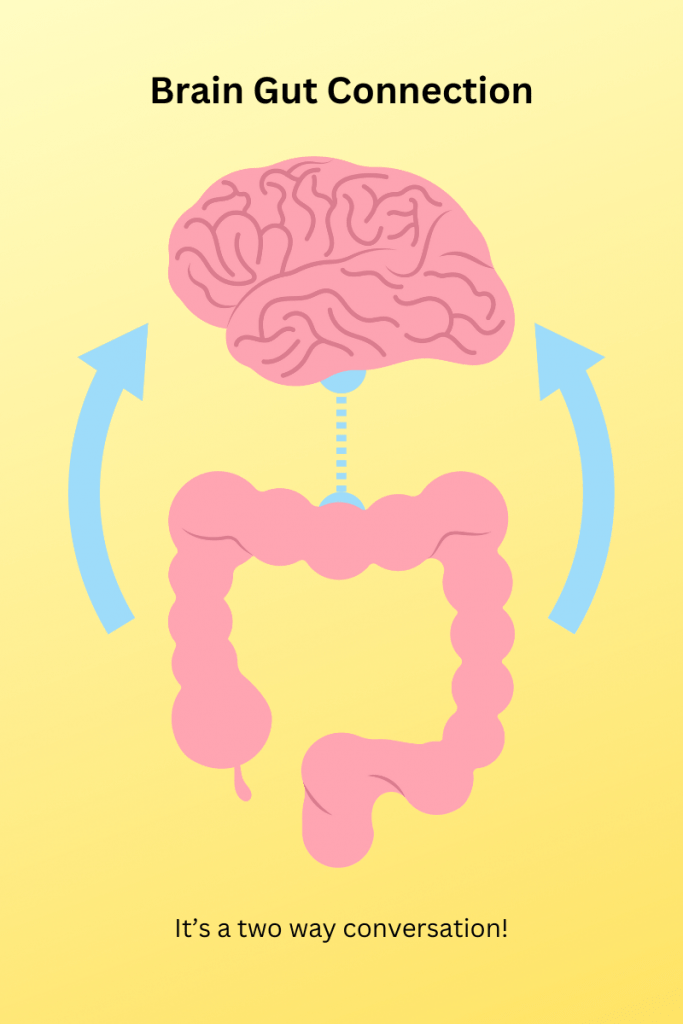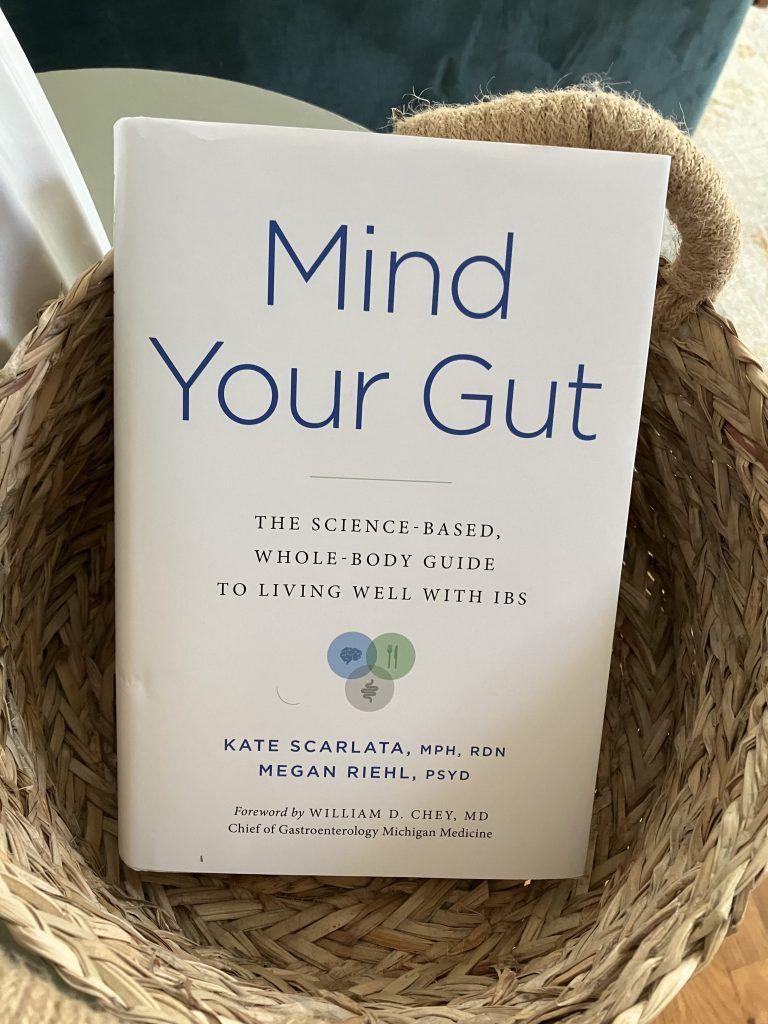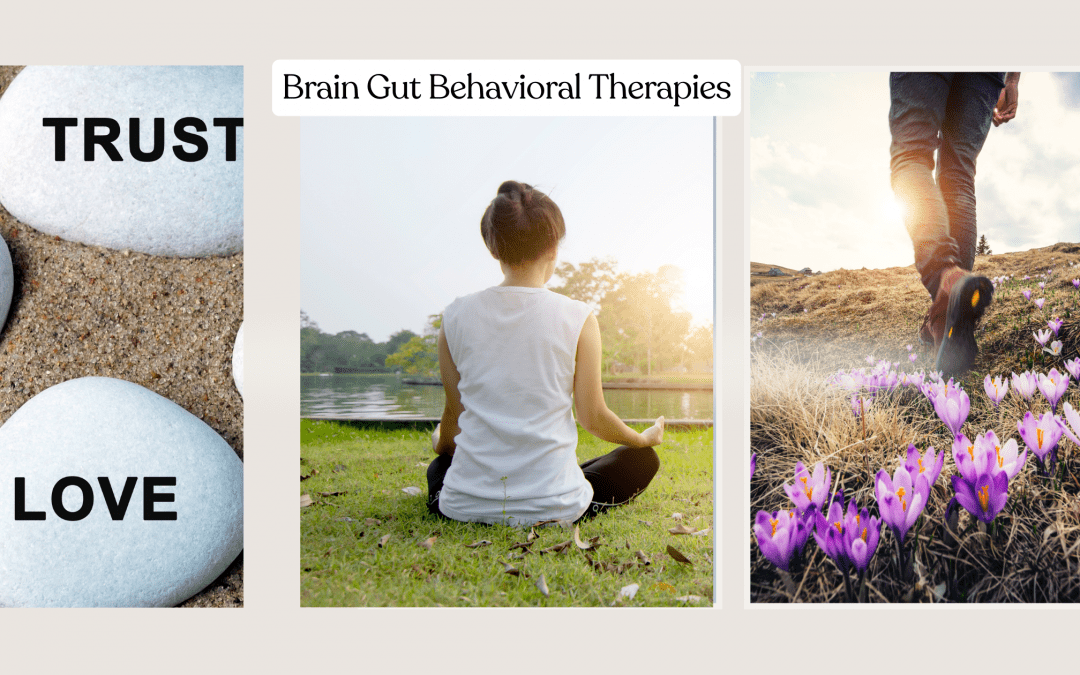Reducing our stress can be as helpful as what we eat in reducing stomach bloat and other IBS symptoms. I want to share more about this with you, as well as a new book called “Mind Your Gut” by Registered Dietitian Kate Scarlata and GI Psychologist Megan Riehl.
Their book is appropriately named because of the close relationship between the brain and the gut. Let’s look at a few facts about this connection.
Let’s Talk About the Gut Mind Connection
What is all this gut-mind connection all about? Here is a little more what is meant by this.

What is the Gut Mind Connection?
The gut and the brain have a two-way communication system. They work together on many issues, including stress levels and mood, gut muscle movements (motility), hunger and satiety, digestion and food sensitivity, and intolerances.
The gut makes 90% of our serotonin and 50% of our dopamine neurotransmitters, critical for the brain’s function!
The Gut and Brain: A Surprising Connection (brainfacts.org)
Gut Brain Basics
Let’s discuss the nervous system and how the brain and gut are connected. The central nervous system includes the brain and spinal cord (CNS) and the peripheral nervous system (PNS) is the collection of nerves all over the body.
The PNS includes the somatic nervous system, which moves our body when we choose. However, the other part of it is the autonomic nervous system, which is where our involuntary movements happen, such as our heart beating and food moving down the digestive tract.
We don’t voluntarily say, “Let’s digest our food; it happens after eating.
The autonomic nervous system is further broken down into:
- Sympathetic Nervous System: this is our “fight or flight response,” and it kicks in when we are stressed, so it speeds things up
- Parasympathetic Nervous System: helps slow things down and is known as “rest and digest.”
- The Enteric Nervous System: known as the second brain, resides in the digestive tract.
The brain and gut two-way communication is made possible by the vagus nerve.
How Stress Affects Your Gut Health
Here are just a few ways that anxiety and stress can affect your digestive health:
- Changes the two-way communication between the gut and brain.
- Affects the gut muscle movements and the digestive secretions.
- It increases the likelihood of gut permeability, which causes things in the gut to escape into the blood where they should not be.
- Reduces the quality and quantity of healthy gut bacteria.
- This leads to increased undesirable GI symptoms such as stomach bloat, diarrhea, and even constipation from stress.
Stress, Anxiety, and Irritable Bowel Syndrome (healthline.com)
How stress affects gut health | Psychologies
Clients often ask:
Can anxiety cause indigestion?
Can you get stomach cramps from stress?
Can anxiety cause gastritis?
Can stress make IBS worse?
Yes, for some people, it really can!
Here are a few tips to help reduce stress .
Let’s talk more about the “Mind Your Gut” book!

Learn More About Mind Your Gut
I want to share a new book called “Mind Your Gut” by Kate Scarlata, a Registered Dietitian, and Megan Riehl, a GI Psychologist. Their book shares excellent information on behavioral therapies to help heal your gut and practical nutrition advice for mindful gut nutrition!
As a registered dietitian specializing in IBS, I have been helping people improve their gut health and work with the low fodmap diet, which can help about 85 % of people suffering from IBS.
However, what if following an elimination diet harms some people more than it helps, is too difficult to follow, or does not work?
Behavioral health therapies are as effective as the low fodmap diet at reducing symptoms! I also love that more behavioral therapy can improve other aspects of people’s lives!
Here Are Some of the Behavioral Therapies Included in the Book
- Using self-care techniques to manage your health. Here are some ideas.
- Changing the ways you think to improve your lifestyle with cognitive behavioral therapy.
- Implementing gut-directed hypnotherapy to help improve brain-gut function.
- Practicing mindfulness and stress reduction techniques to reduce IBS symptoms.
I love the Mind Your Gut Record and Progressive Gut-Directed Relaxation! Yes, please!
If you want more explanation on the gut-brain connection, this book has it too.
More IBS Zen
The book discusses using healthy coping skills such as:
- Open up, and don’t hide your feelings.
- Replace negative thinking with positive.
- Enjoy life and not be overthinking everything.
- Include Nature as Medicine. Start a garden or do some forest bathing.
- Use positive affirmations or even set a mantra to remind you of your core values.
How to Eat a Brain-Gut Connection Diet
Because the brain and gut communicate in a two-way way, it makes sense that the healthier our gut is, the more our brain benefits. Research has shown that nurturing healthy gut bacteria helps keep our brains healthy.
We can add natural probiotics to our gut by adding fermented foods to our diet. Here is more information about fermented foods.
Prebiotics are foods like broccoli, almonds, and walnuts. These foods provide the fuel to feed the healthy bacteria.
Kate provides excellent suggestions for making healthy eating easy and not being overly strict. The recipes and menu ideas look delicious!
This book is an excellent resource for people suffering from IBS. It helps them better understand the gut-brain connection and ways to heal it. You can learn more about getting the book at Kate’s website.
How to Find a Gut Psychologist
If you are looking for a gut psychologist to help you with gut-directed hypnotherapy, the Rome Foundation website might have one.
Learning how stress affects our gut is the beginning of building a healthy gut-brain connection. Stress also affects many other chronic illnesses, including many body systems. So practicing the things in “Mind Your Gut” can help in many different ways!
Can a Dietitian Help with IBS?
Yes, a dietitian and psychologist can help with IBS and help you reduce stress and bloating. To find a dietitian who can work with you to help, check out the Monash Fodmap Dietitian Directory. In addition, social support can be a powerful tool to help you stick with it and run ideas with your peers. I have just started a new online social support group called the Growing Vine Community, which has a Digestive Health Vine. It is a great way to connect with others who are working on things similar to yours!


